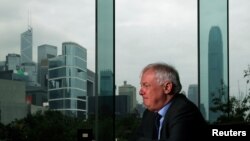As Britain’s last governor of Hong Kong, Chris Patten introduced a series of democratic reforms in preparation for what was expected to be 50 years of relative autonomy following the territory’s return to Chinese sovereignty in 1997. Since then, he has watched that autonomy get slowly whittled away.
What Beijing has done to Hong Kong is the “biggest assault on freedom and liberty in any city in the 21st century, certainly as big as anywhere else,” Patten said at a virtual policy forum last week.
“What they’re doing in Hong Kong is to destroy what was promised in Hong Kong: a high degree of autonomy — one country, two systems. They’re doing that in a way which I must say will give Taiwan even greater room for thought because I’m sure what they’re doing in Hong Kong, they would like to do one day in Taiwan.”
Patten spoke at a discussion on the future of Hong Kong organized by the Canada-based Macdonald-Laurier Institute in partnership with the London-based Hong Kong Watch, the EU-based European Values Center for Security Policy and the multinational Inter-Parliamentary Alliance on China.
Discussing Chinese leader Xi Jinping’s objective in Hong Kong, Patten said: “In so far that he cares a jot about Hong Kong — I’m not sure he does, really — is that Hong Kong should simply be another Shenzhen, a neighbor to Shenzhen that loves China and therefore loves the Communist Party.”
Shenzhen is the southernmost city of China’s continental territory, bordering Hong Kong.
The Chinese Communist Party’s decision to rule Hong Kong in the same way as the rest of China not only deprives Hong Kongers of the lifestyle and freedoms they cherish, but also stands to slow China’s own economic development, Patten said.
"We know that 70% of direct investment that goes into China, and investment that comes out, goes through Hong Kong," he said. "We know about the importance of [initial public offerings] which are funded through Hong Kong."
"One reason why so many investors will make their excuses and disappear to Singapore or to Seoul or to Tokyo is that they know the importance of free flow of information," he added. "They know that’s not possible in a Chinese communist system."
In the 90-minute seminar that also featured other speakers, Patten said the current decade “may represent what’s called ‘peak China,’” but it is important not to exaggerate China’s importance to the rest of the world.
“It’s true that China is the largest country in the world, and it’s true that China is a huge market for us. But the truth of the matter is: China needs us just as much, and perhaps in some respects even more, than we need China.”
British exports to China have increased in real terms by just 3% since 1980 while China’s exports to Britain have risen by 9%, he said. “So who’s helping whom?”
“I think it’s very, very important that we don’t fall for the Chinese communist confection that somehow we all need them more than they need us.”
Patten stressed that emerging global efforts to constrain China’s power are not a war against the Chinese people.
“It is not anti-Chinese to say we should stand up for liberal democracy," he said. “Standing up for liberal democracy means standing up for one another,” not the least those in Hong Kong and in the rest of China.
Patten, serving as chancellor of Oxford University since 2003, urged the international community to help “provide a lifeline” to those who dare to resist China and the pro-Beijing Hong Kong authorities, including by providing more Hong Kong students with fellowships to study abroad.




